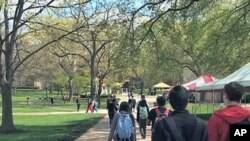At Rutgers University, one student was scoring in a game of virtual soccer. It was a small victory in one of two recovery dorms. The 38 students in the so-called Recovery House there seek a larger victory - a life free of drugs and alcohol.
Counselors asked that current residents not be shown to protect their anonymity.
"Klonopins, Xanax, alcohol, marijuana and all of these were on a daily basis. It escalated to the point where I really couldn’t focus on my schoolwork."
He dropped out of his first university, got clean at a treatment center and applied to Rutgers. He said he's found genuine fellowship in Recovery House.
"These are friends also that I can talk to about some really personal issues that are going on in my life. Previously, my friendships, especially when I was using [drugs], were friendships based on ‘let’s get high together,’" Gregory said.
Lisa Laitman founded the university’s Alcohol and Other Drug Assistance Program. She said students with a good amount of time in recovery help the newcomers break out of the isolation associated with addiction.
"The new person is going to breathe a sigh of relief and say: ‘I’m not alone. I’m not the only one who does these crazy things," said Laitman.
In addition to remaining abstinent, residents must attend twice weekly meetings to discuss their addictions.
Program alumnus Rich Alexander remembers discussions about sobriety. He's been sober for 22 years.
"That’s what we talked about, ‘how are you going to stay sober today?’ And that’s it: today, today, today," said Alexander.
The students also must participate in what's known as the 12-step program for overcoming addiction. Step 9, for example, is about making amends to those the addict has harmed.
"You need to make amends to people to move past how we’ve messed up in the past. And so it’s basically always being aware of our defects of character and making sure that we correct those things," said one recovery house participant.
Cathy, an immigrant from England, said she had lost her daughter to heroin and credits Recovery House for getting her back.
"They do barbecues, they go see hockey games, they have walking activities, cycling activities. So this thing is going on which they do together as a family, team, whatever you want to call it," she said.
Without support, recovering students could relapse into drugs and alcohol. Recovery House means they have the chance to continue their studies without interruption. Rutgers says many program alumni have won big victories in life - higher degrees, successful careers, and meaningful relationships.




